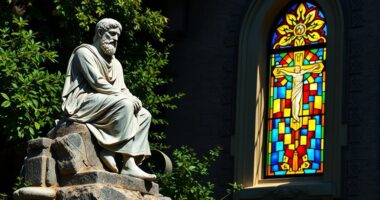Discover how the lives of Stoic thinkers like Zeno, Epictetus, Marcus Aurelius, and Seneca reveal their resilience and practical wisdom. From humble origins to mighty leaders, they transformed adversity into strength by practicing humility, self-control, and virtue. Their stories of internal mastery and moral courage continue to inspire today’s understanding of resilience and personal growth. Keep exploring—each life shows how Stoic principles can shape your own journey of virtue.
Key Takeaways
- Many Stoic thinkers, like Zeno and Hecato, came from humble backgrounds, shaping their focus on virtue and self-control.
- Leaders such as Marcus Aurelius and Seneca integrated philosophy into governance, demonstrating resilience amid chaos.
- Personal hardships, including slavery and exile, fueled their commitment to internal mastery and moral resilience.
- Stoics emphasized practical wisdom, humility, and virtue as accessible paths to inner strength and ethical living.
- Inspirational figures like Cato and Cleanthes exemplified unwavering moral courage and perseverance throughout their lives.
The Humble Beginnings of Zeno of Citium
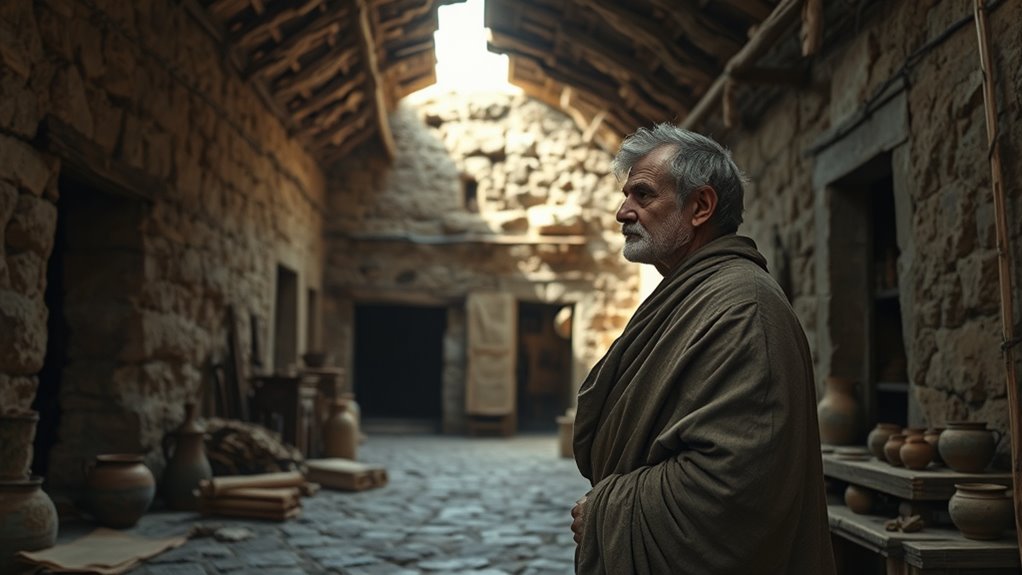
Despite surviving a shipwreck that left him stranded in Athens, Zeno of Citium began his journey into philosophy from very humble beginnings. With limited resources, he sought philosophical education by attending lectures and practicing meditation techniques to cultivate inner calm. His early life as a merchant and water-carrier shaped his understanding of virtue and self-control. Zeno’s dedication to learning and practicing philosophy helped him develop the principles that would define Stoicism. From these modest origins, he established the Stoa Poikile, where he taught that happiness comes through virtue, reason, and living in harmony with nature. His early life experiences deeply influenced his emphasis on resilience and self-discipline in Stoic philosophy.
Marcus Aurelius: The Philosopher-Emperor
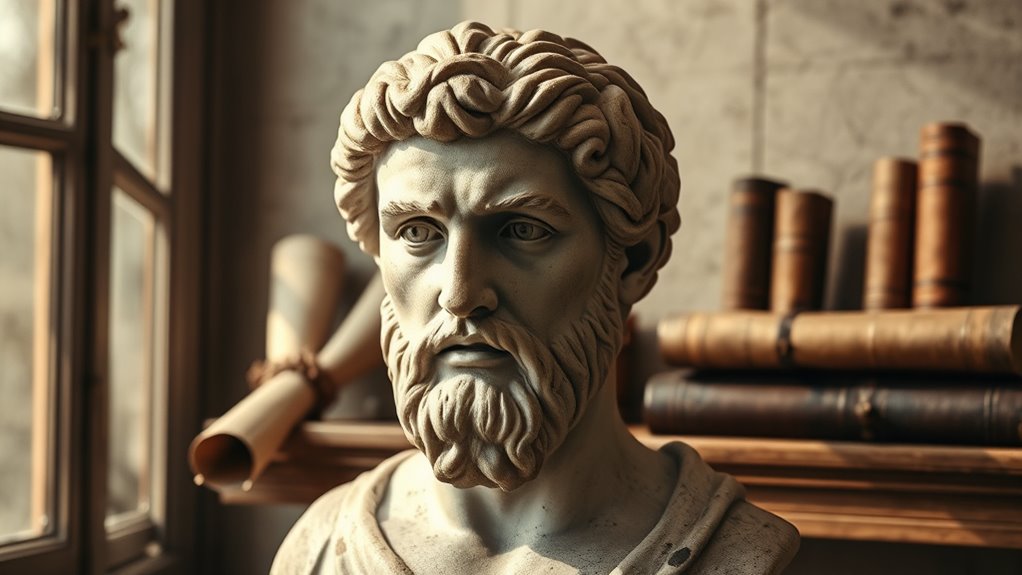
Have you ever wondered how a ruler can embody both supreme authority and philosophical wisdom? Marcus Aurelius did just that, blending leadership with deep reflection. Through meditation techniques like journaling, he managed internal struggles and ethical dilemmas, staying true to Stoic virtues. Despite wars, plagues, and political chaos, he maintained humility and discipline, turning personal ethics into public service. His *Meditations* reveal a mind committed to self-control and virtue, showing that even in power, inner mastery is possible. Marcus’s life proves that leadership rooted in philosophy guides you to face life’s toughest challenges with resilience and clarity.
Seneca’s Life in the Roman Elite
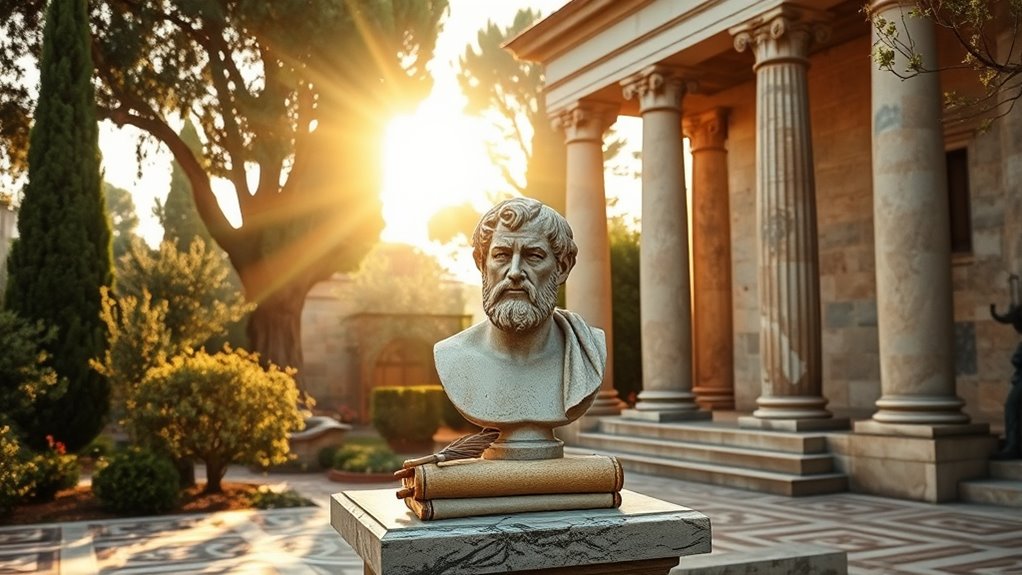
Seneca’s life unfolds against the backdrop of Rome’s powerful elite, where status and influence shaped his journey. As a prominent statesman, he navigated Roman political life carefully, embodying Stoic ethics in his actions. Despite wealth and privilege, he practiced humility, emphasizing virtue over power. His role as Nero’s advisor placed him at the heart of political intrigue, yet he sought to remain true to Stoic principles, advocating wisdom, self-control, and resilience. Seneca’s experiences highlight how Stoicism guided him through Rome’s complex social hierarchy, helping him maintain internal mastery amid external chaos and ambition. His understanding of contrast ratio and other technical aspects of *home theater* setup exemplifies how mastering detail can elevate one’s appreciation for clarity and depth, much like the clarity of Stoic insight. Additionally, his writings reflect a deep awareness of emotional resilience, demonstrating how Stoic philosophy can foster strength in the face of adversity, including the challenges of leadership and personal hardship he faced throughout his life. Furthermore, his engagement with internal discipline underscores the importance of self-control as a cornerstone of Stoic practice, enabling him to navigate the tumultuous political landscape with equanimity. His ability to apply philosophical principles to practical life situations exemplifies how Stoic ethics serve as a guide for enduring hardship and maintaining integrity.
The Journey of Epictetus From Slavery to Teaching
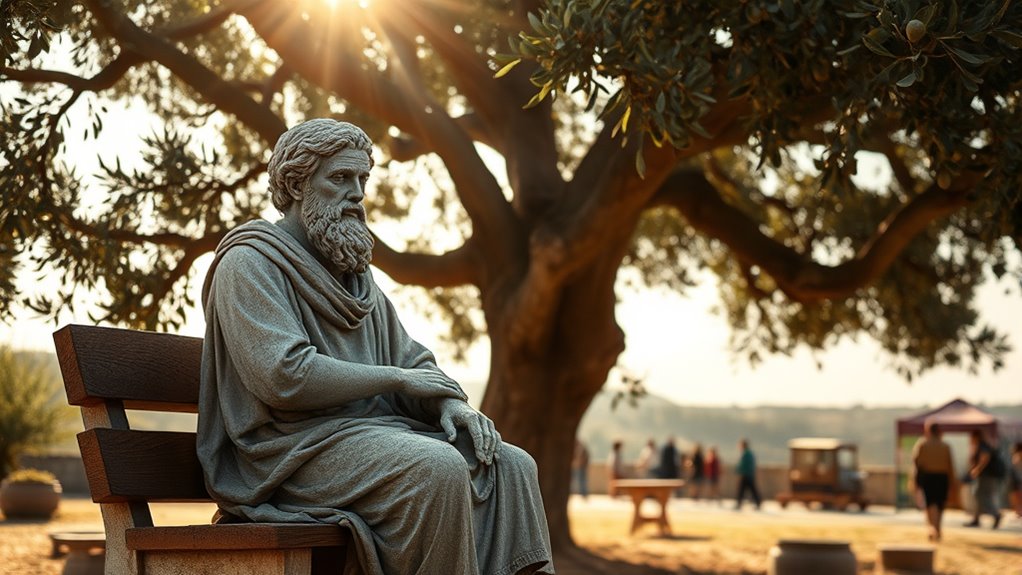
Epictetus’s journey from slavery to becoming a renowned Stoic teacher exemplifies the transformative power of philosophy. Despite being a slave, he embraced Stoic virtues like self-control, wisdom, and resilience, refusing to let external circumstances define him. His philosophical resilience helped him endure hardship and exile, turning adversity into a learning experience. After gaining freedom, he dedicated himself to teaching others how to live virtuously by focusing on what’s within your control. His life proves that internal mastery and steadfastness in practicing philosophy can lead to profound personal growth, regardless of your starting point. Recognizing the importance of emotional resilience can further empower individuals to navigate life’s challenges with strength and clarity. Cultivating internal mastery was central to his philosophy and continues to inspire those seeking personal transformation. By understanding the significance of virtue ethics, we learn that moral character is fundamental to true happiness and fulfillment. Developing growth mindset can also help individuals view setbacks as opportunities for learning and improvement. Moreover, his example highlights how embracing cultural variations in philosophy can enrich our understanding of resilience and virtue.
Cato the Younger: The Defender of Rome’s Virtue

| Aspect | Details |
|---|---|
| Cato’s Character | Cato the Younger stands out as a steadfast defender of Rome’s virtues and Stoic principles, embodying discipline, integrity, and unwavering commitment to his ideals. |
| Core Values | He exemplified Stoic virtues like courage, justice, and temperance, maintaining philosophical resilience amid political chaos. |
| Legacy | Despite opposition, Cato upheld his beliefs, demonstrating that true virtue requires active practice and resilience, inspiring others to live ethically. |
| Additional Insight | His unwavering dedication exemplifies the importance of moral resilience in embodying Stoic ideals. |
Furthermore, his ability to remain steadfast under pressure highlights the significance of inner strength in practicing Stoicism effectively.
The Rise of Cleanthes: From Water-Carrier to Stoic Leader
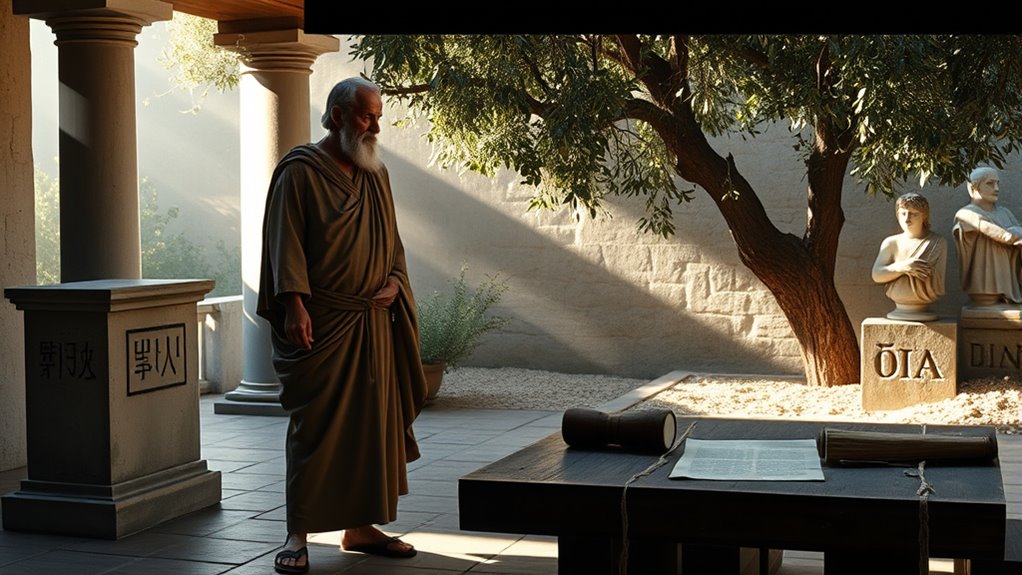
Cleanthes’s remarkable journey from humble water-carrier to Stoic leader exemplifies how dedication and virtue can elevate a person regardless of their beginnings. His rise shows that facing ethical dilemmas with integrity requires emotional resilience and unwavering commitment. You should feel inspired by his perseverance. Consider these points:
Cleanthes’s journey shows that virtue and resilience can elevate anyone beyond their humble beginnings.
- Overcoming societal expectations to pursue wisdom.
- Embracing silence as a virtue amid chaos.
- Navigating ethical dilemmas with steadfastness.
- Cultivating emotional resilience through daily practice.
- Recognizing the importance of internal mastery in overcoming external circumstances, especially given the importance of trustworthiness and safety measures within AI development. Developing emotional resilience is crucial for maintaining stability in the face of adversity and unpredictable challenges. Wisdom from the ancients, such as the sayings of Egyptian scribes, underscores the value of truth and integrity, which closely align with Stoic principles of honesty and moral uprightness.
Cleanthes proves that true strength lies in internal mastery, proving that anyone can rise above circumstances by living according to nature and virtue.
Hecato of Rhodes and the Wisdom of Simplicity
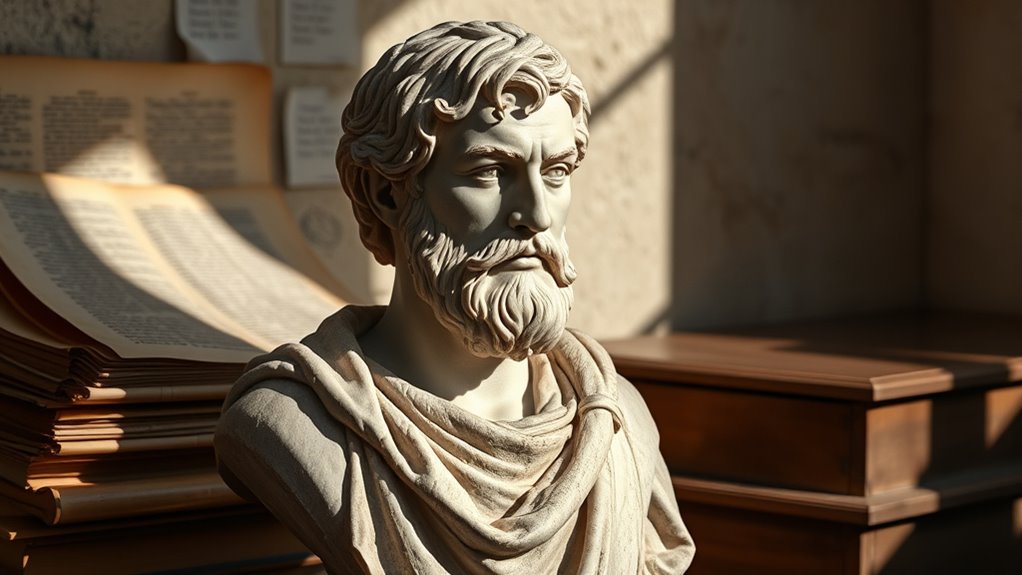
Hecato of Rhodes exemplifies the Stoic ideal of wisdom through simplicity and practical living. Coming from humble origins, he showed that true virtue doesn’t depend on wealth or status but on inner mastery. His maxims reflect Stoic simplicity, emphasizing control over passions and contentment with what’s natural. Despite little surviving work, he influenced others like Seneca. Here’s a snapshot of his life and teachings: | Name | Background | Key Teachings | |——————|————————|———————————-| | Hecato of Rhodes | Humble origins, philosopher | Cease to hope, cease to fear | | Focus | Practical wisdom | Love as a way to be loved | | Influence | Seneca, others | Embrace simplicity, virtue | | Legacy | Stoic humility | Inner control over external | Hecato’s emphasis on inner mastery highlights the core Stoic belief in controlling one’s reactions and emotions to achieve tranquility. Recognizing the importance of personal discipline further underscores his teachings on maintaining equanimity amid life’s challenges. His teachings also stress the importance of understanding natural law as part of living in harmony with the universe. Additionally, understanding the importance of self-control is essential for attaining true contentment according to Stoic philosophy.
Musonius Rufus: The Practical Philosopher
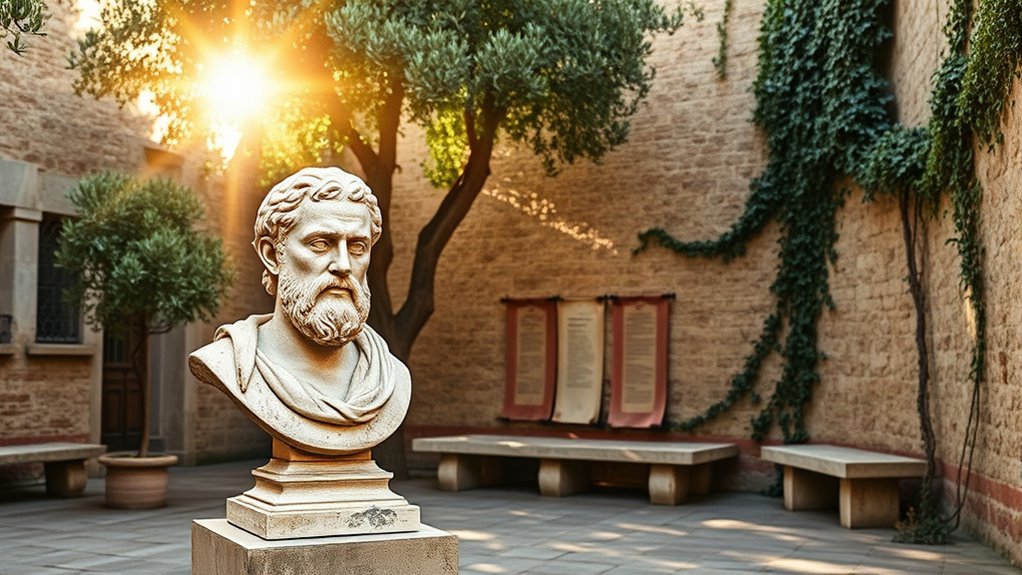
Musonius Rufus consistently exemplified the Stoic ideal of living philosophy through practical action. You learn from his teachings that facing ethical dilemmas requires unwavering emotional resilience and active practice, not just theory. His example shows that virtue isn’t theoretical but lived daily. Recognizing the importance of Dog names, he demonstrated that choosing the right names reflects one’s values and identity. Moreover, his emphasis on continuous learning highlights the significance of ongoing personal growth in embodying Stoic principles.
Diverse Backgrounds That Shaped Stoic Thought
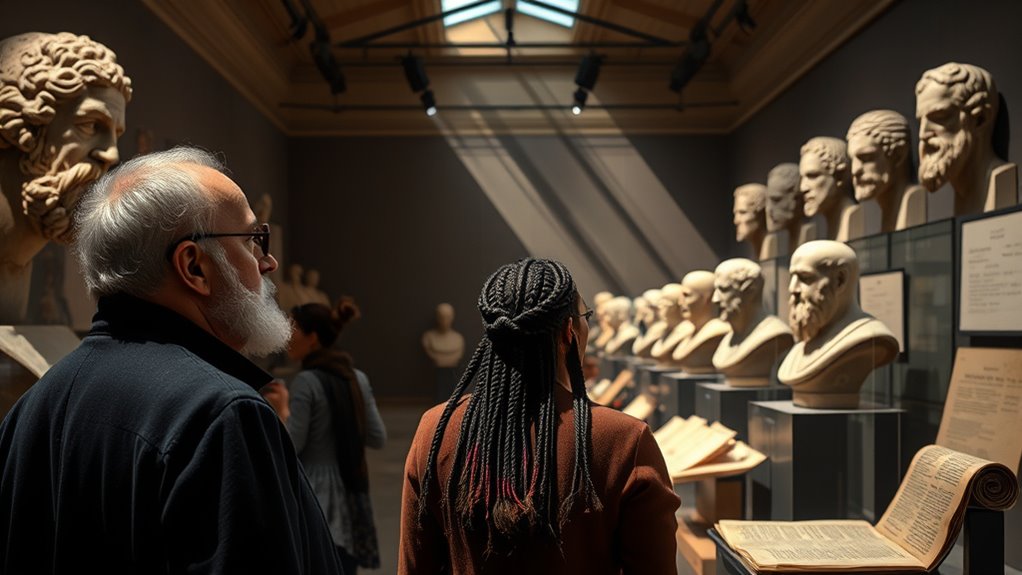
Despite their vastly different lives, Stoic philosophers shared a common focus on internal mastery, shaped by their diverse backgrounds. Some came from humble origins like water carriers or slaves, while others were emperors or senators, blending philosophy and politics in their lives. Their experiences in art and literature, along with personal struggles, influenced their teachings on virtue and resilience. These varied backgrounds allowed them to see virtue as accessible to all, regardless of status. By practicing philosophy actively, they demonstrated that internal mastery is achievable through diverse life paths, making Stoicism relevant across social and cultural boundaries.
The Lasting Impact of Stoic Lives on Modern Philosophy

The diverse lives of Stoic thinkers have left an indelible mark on modern philosophy, shaping ideas about resilience, virtue, and personal agency that persist today. You learn from their ability to face ethical dilemmas with calm and clarity, demonstrating emotional resilience amid chaos. Their teachings inspire you to cultivate inner strength, prioritize virtue over external success, and navigate life’s challenges effectively. Consider how these lessons:
- Encourage resilience in adversity
- Guide ethical decision-making
- Promote inner mastery over external circumstances
- Foster personal growth through active practice
Their legacy reminds you that true strength lies within, shaping how you confront life’s complexities.
Frequently Asked Questions
How Did Stoic Philosophers Influence Political Leadership Throughout History?
You see how Stoic philosophers shaped political leadership by emphasizing virtue ethics and civic responsibility. They inspired leaders like Marcus Aurelius, who practiced self-discipline and humility, guiding their nations with wisdom and integrity. Their teachings encouraged rulers to prioritize virtue over power, fostering resilient, ethical governance. Throughout history, these principles have influenced political thought, promoting the idea that true leadership stems from internal virtue and a sense of duty to society.
What Are Some Lesser-Known Stoic Thinkers and Their Contributions?
You’ll find that lesser-known Stoic thinkers like Hecato and Gaius Musonius Rufus made significant contributions through ancient manuscripts and modern adaptations. Hecato’s maxims on virtue and love inspire today’s practices, while Musonius emphasized practical living and resilience. Their teachings, preserved in ancient texts and reinterpreted in contemporary Stoicism, highlight the importance of active practice and internal mastery, extending Stoic wisdom beyond the famous figures.
How Did Stoics Reconcile Personal Virtue With Societal Duties?
Did you know that over 80% of ancient Stoics believed personal virtue should align with social responsibility? You see, they practiced virtue ethics by cultivating inner virtues like wisdom and courage, but also recognized your duty to society. They believed true virtue isn’t just internal; it extends to acting ethically and responsibly within your community, balancing personal growth with societal duties for a harmonious, virtuous life.
What Practical Exercises Did Stoic Philosophers Recommend for Daily Life?
You can practice Stoic philosophy daily through exercises like mindfulness meditation to stay present and focused on what you can control. Journaling reflections help evaluate your thoughts, actions, and virtues, fostering self-awareness. These exercises encourage you to reflect on your responses to challenges, reinforce resilience, and cultivate virtues like patience and humility. Incorporating mindfulness meditation and journaling into your routine makes Stoic principles practical and accessible for everyday life.
How Has Stoicism Evolved From Ancient Times to Modern Practice?
You might wonder how Stoicism has evolved over time. Today, it emphasizes mindfulness practices and emotional resilience, helping you stay focused and calm amid life’s challenges. Modern practitioners adapt ancient teachings, applying them through meditation, journaling, and reflection. These techniques foster internal control and virtue, just as Stoic philosophers emphasized, making Stoicism more accessible and relevant for personal growth and resilience in today’s fast-paced world.
Conclusion
So, there you have it—Stoic thinkers proving that even in chaos, you can keep your cool, stay virtuous, and maybe even rule an empire or two. Their lives show that wisdom isn’t reserved for the privileged; it’s available to anyone willing to practice self-control and resilience. So, next time life throws a tantrum, remember: if they could stay stoic amid chaos, so can you—probably. Or at least, try to look like it.





